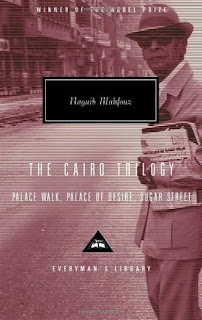Exploring Egypt: February 2021
Exploring Egypt: February 2021
#InvisibleCitiesProject
Throughout the month of February I had lofty goals to read four to five books translated from Egypt. As many of you who have been around my blog for a while will know, I often bite off more than I can chew when it comes to reading plans, February 2021 was no exception. This month I only completed one novel in translation for Egypt, Palace Walk by: Niguib Mafouz Translated by: William Hutchins. When listing the books I was eager to read, I should have known that Palace Walk was going to take quite some time for me to read given its length, 501 pages to be exact. My Goodreads goal is the only one who is sad about me only reading one book during the month of February, I enjoyed the languid stroll I took through this novel.
Mafouz effortlessly transports the reader to Egypt, allowing them to experience the sights, sounds, smells, and turmoil that the country has gone through. Admittedly the smells may be difficult to imagine when simply read from the page, however, I made a dish that was discussed in the novel to amplify the reading experience. You can find the link to the recipes I used for Hawawshi and Couscous with olives and Sun-dried Tomato at the bottom of this post. Regardless of your imagination taking over and allowing you to smell the food discussed in this novel, the setting comes to life on the page. Mafouz captures the essence of place, Palace Walk (a street in Cairo I believe), through guarded glances between women, observations from the children of the house, marriage alliances, and omniscient narration. The whole novel takes place largely on two streets, where Amina (wife) and her children (two daughters and three sons) and the master of the house Al-Sayyid reside and strive to live a model Egyptian way of life. I initially was concerned with the limited setting of this book, however the broader discussion of family, marriage, love, and a British occupied Egypt maintained an engaging plot albeit slow moving one.
Exploring a place at such a small scale allows the reader to become intimately connected to the setting and each character's struggles to make their way in a turbulent world. I genuinely felt transported to Egypt, though I have never been to the country in reality, each time I picked up this book! This sense of travel and wonder is exactly what we are striving towards with the #InvisibleCitiesProject so each of us can experience different cultures and regions of the world from the comfort and safety of our homes during the current pandemic.
Watching the young men of the family struggle to find their role in society and the greater heirarchy of the immediate family gave me hope that I am not the only one grappling with similar issues. Growing up and forming one's own opinions is something that as we see in the novel can cause great strain on a family dynamic. Through the eyes of the eldest sons we are able to experience their hope for an unoccupied Egypt, and conflict between following the patriarch's wishes and standing up for what they believe in is something that everyone is forced to do at least once in their life. Mafouz captured youthful hope, naivety, and actions perfectly in this novel. Capturing a child or even teenagers struggles while not allowing them to appear trite on the page is a difficult task that in this instance was done very well.
Suffice it to say that I loved this novel and am eager to continue with the trilogy in the near future. If you are afraid of the length of this novel I suggest checking out the audiobook, as I did. The narrator is engaging, adds to the atmosphere of the story, and helps to propel the story along during slower portions of the novel.
Star Rating: 5/5
Goodreads Link: https://www.goodreads.com/book/show/5488.The_Cairo_Trilogy?from_search=true&from_srp=true&qid=Ur3Vl48dFD&rank=2
Due to the length of this novel I was unable to finish anything else during the month of February for Invisible Cities, however after experiencing this book I look forward to exploring Egyptian culture and literature more in the future.

Comments
Post a Comment